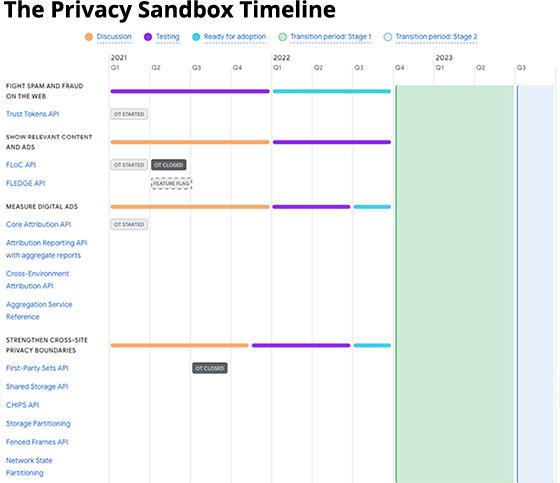
Google’s monthly timeline update for Privacy Sandbox shows the company will delay FLoC testing to Q1 2022, from Q4 2021, as announced in July.
Testing of FLEDGE -- the company’s remarketing solution designed to eliminate third-parties tracking of user
behavior, along with the measurement of digital ads -- is delayed until Q1 2022.
As Google moves the industry toward the phasing out of third-party cookies, it needs to introduce APIs enabling
options that depend on them, but without enabling cross-site tracking.
advertisement
advertisement
The ability to show relevant content and ads will extend through Q4 2021, as Google works on changes. The
expectation, Google says, is that FLoC and FLEDGE will become available for wider testing by sometime in Q1 2022.
Though likely directly related, Google’s notice comes shortly after a
detailed blog post from Criteo, whose data scientists have been running tests, point out major flaws in FLoC.
Antoine Rouzaud, data scientist at Criteo, detailed in late September a test on
how well FLoC cohorts served the marketers’ needs for matching ads to people and optimizing return on ad spend. There have been several updates on other processes, too.
“If the Adtech industry is to use
FLoC to build audiences to target, it becomes essential for marketers to understand what’s behind the opaque cohort ID assigned to each group of users,” he wrote. “We showcased one
method to so, that proved successful for some of the biggest cohorts. However, the low volume was once again a blocker to validate that it worked for a majority of cohorts.”
He went on
to explain that the granularity calls into question the utility of this approach for real world needs, and that the performances generated by these interest-based audiences compared with third-party
cookies remain “highly debatable.”
Here are key points made by Rouzaud:
- FLoC cohorts are built on top of different domains that change over time -
meaning these domains are not sufficient to characterize a FLoC cohort in terms of user interest over time
- The FLoC algorithm barely regroups similar users in
terms of browsing history - only the biggest cohorts show good enough similarity, but do not represent the majority of cohorts observed during the Origin Trial
- Regrouping the
domains browsed by topic categories may allow us to temporarily interpret the opaque FLoC numerical IDs
Google’s timeline divides the rollout into four
categories, the ability to fight spam and fraud, show relevant content and ads, measure digital ads, and strengthen cross-site privacy boundaries. The stages are Discussion, Testing, Adoption,
Transition Stage 1, and Transition Stage 2.
During the final transition period, Stage 2, Google Chrome will phase out support for third-party cookies during a three-month period to complete the
task in 2023